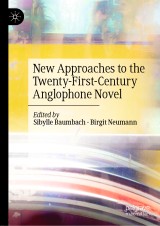Details

New Approaches to the Twenty-First-Century Anglophone Novel
|
128,39 € |
|
| Verlag: | Palgrave Macmillan |
| Format: | |
| Veröffentl.: | 20.12.2019 |
| ISBN/EAN: | 9783030325985 |
| Sprache: | englisch |
Dieses eBook enthält ein Wasserzeichen.
Beschreibungen
<div><p>This book discusses the complex ways in which the novel offers a vibrant arena for critically engaging with our contemporary world and scrutinises the genre's political, ethical, and aesthetic value. Far-reaching cultural, political, and technological changes during the past two decades have created new contexts for the novel, which have yet to be accounted for in literary studies. Addressing the need for fresh transdisciplinary approaches that explore these developments, the book focuses on the multifaceted responses of the novel to key global challenges, including migration and cosmopolitanism, posthumanism and ecosickness, human and animal rights, affect and biopolitics, human cognition and anxieties of inattention, and the transculturality of terror. By doing so, it testifies to the ongoing cultural relevance of the genre. Lastly, it examines a range of 21st-century Anglophone novels to encourage new critical discourses in literary studies.</p></div>
<p>Chapter 1. The Novel — An Undead Genre (Sibylle Baumbach and Birgit Neumann).- Chapter 2. Human Rights and Transnational Justice in the Contemporary Anglophone Novel: J.M. Coetzee’s <i>Disgrace</i>and Achmat Dangor’s <i>Bitter Fruit </i>(Sangina Patnaik).- Chapter 3. The Economy of Attention and the Novel (Sibylle Baumbach).- Chapter 4. Twenty-First-Century Fictional Experiments with Emotion and Cognition (Suzanne Keen).- Chapter 5. ‘Reality Hunger,’ Documentarism, and Fragmentation in Twenty-First-Century Anglophone Novels (Alexander Scherr and Ansgar Nünning).- Chapter 6. Cli-Fi: Environmental Literature for the Anthropocene (Laura Wright).- Chapter 7. The Animal Novel That Therefore This is Not? (Kari Weil).- Chapter 8. We Have Always Already Been Becoming Posthuman? Posthumanism in Theory and (Reading) Practice (Roman Bartosch).- Chapter 9. What is ‘the’ Neoliberal Novel? Neoliberalism, Finance, and Biopolitics (Arne De Boever).- Chapter 10. The Novel after 9/11: From Ground Zero to the “War on Terror” (Michael C. Frank).- Chapter 11. Post-National Futures in Nationalist Contexts? Reading ‘British’ Fictions of Artificial Intelligence (Will Slocombe).- Chapter 12. Anglophone World Literature and Glocal Memories: Chimamanda Ngozi Adichie’s <i>Half of a Yellow Sun</i> and Kiran Desai’s <i>The Inheritance of Loss</i> (Birgit Neumann).- Chapter 13. Afropolitanism and the Novel: Mapping Material Networks in Recent Fiction from the African Diaspora (Jennifer Wawrzinek).- Chapter 14. Temporality in the Contemporary Global South Novel (Russell West-Pavlov).- Chapter 15. Beyond the Written Word: Graphic Novels in the Twenty-First Century (Lukas Etter and Jan-Noël Thon).- Chapter 16. The Limits of Fictional Ontologies in Bret Easton Ellis’ <i>American Psycho</i> and Kazuo Ishiguro’s <i>Never Let Me Go<b> </b></i>(Roger Lüdeke).- Chapter 17. The End of the Novel (Pieter Vermeulen).<br></p>
<p></p><p><b>Sibylle Baumbach</b> is a Professor of English Literatures at Stuttgart University (Germany). </p>
<p><b>Birgit Neumann</b> is a Professor of English Literature and Anglophone Studies at Heinrich Heine University Düsseldorf (Germany).</p><p></p>
<p><b>Birgit Neumann</b> is a Professor of English Literature and Anglophone Studies at Heinrich Heine University Düsseldorf (Germany).</p><p></p>
This book discusses the complex ways in which the novel offers a vibrant arena for critically engaging with our contemporary world and scrutinises the genre's political, ethical, and aesthetic value. Far-reaching cultural, political, and technological changes during the past two decades have created new contexts for the novel, which have yet to be accounted for in literary studies. Addressing the need for fresh transdisciplinary approaches that explore these developments, the book focuses on the multifaceted responses of the novel to key global challenges, including migration and cosmopolitanism, posthumanism and ecosickness, human and animal rights, affect and biopolitics, human cognition and anxieties of inattention, and the transculturality of terror. By doing so, it testifies to the ongoing cultural relevance of the genre. Lastly, it examines a range of 21st-century Anglophone novels to encourage new critical discourses in literary studies.<br><div><br></div><div><p><b>Sibylle Baumbach</b> is a Professor of English Literatures at Stuttgart University, Germany. </p><p><b>Birgit Neumann</b> is a Professor of English Literature and Anglophone Studies at Heinrich Heine University Düsseldorf, Germany.</p></div>
<p>Discusses the complex ways in which the novel offers a vibrant arena for critically engaging with our contemporary world and scrutinises the genre's political, ethical, and aesthetic value</p><p>Encourages new critical discourses in literary studies</p><p>Addresses the need for fresh transdisciplinary approaches</p><p>Focuses on the multifaceted responses of the novel to key global challenges</p>
Diese Produkte könnten Sie auch interessieren:

The Enigma of Good and Evil: The Moral Sentiment in Literature

von: Anna-Teresa Tymieniecka

309,23 €















